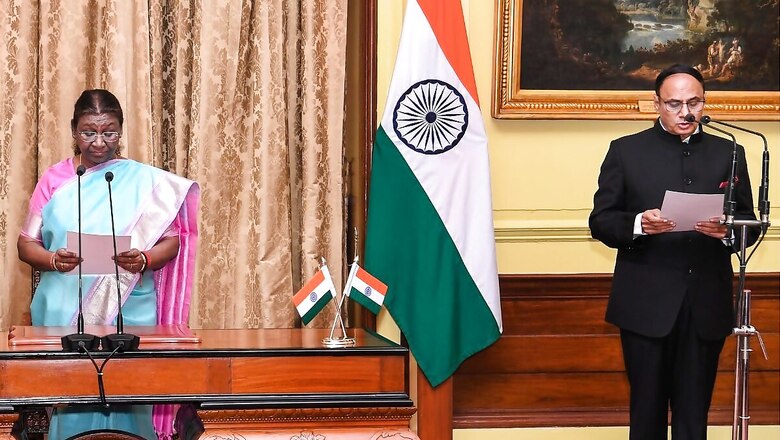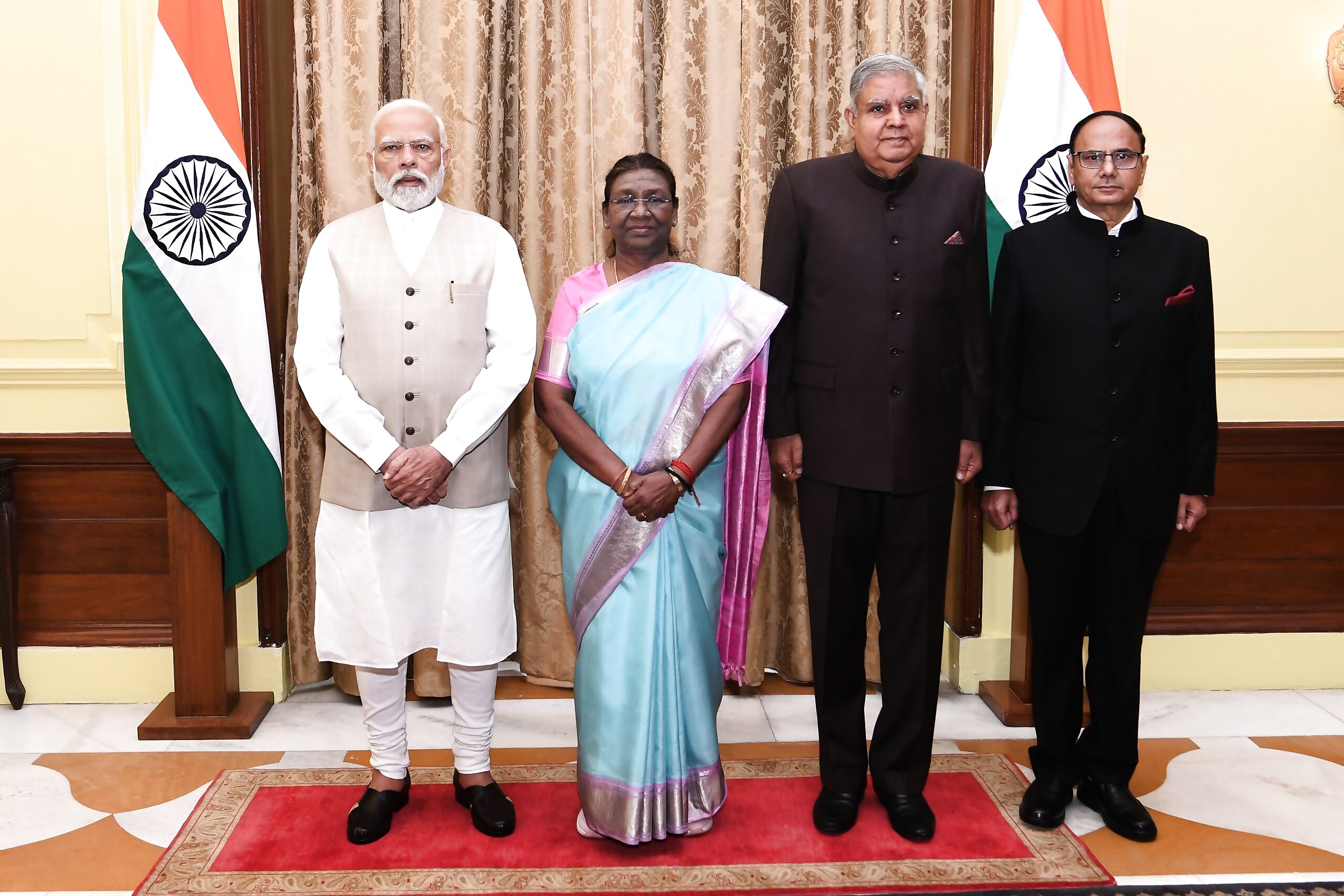
views
The appointment of former IAS officer Heeralal Samariya as the Chief Information Commissioner (CIC) on Monday has started another row between the Opposition and the ruling Bharatiya Janata Party-led Centre.
In a letter to President Droupadi Murmu, Adhir Ranjan Chowdhury, Congress MP and member of the selection committee for appointment of the Chief Information Commissioner, has claimed he was “kept in the dark” about the selection process and that all democratic norms, customs and procedures were “thrown to the wind”.
Responding to it, Prime Minister Narendra Modi said, “They had to come to the meeting , letters were sent to them, phone calls were also made, but when they came to know that one Dalit man is going to be CIC, they boycotted the meeting. Every time they do so…They had also raised questions during the President election.”
Here’s all you need to know about the controversy, appointment and role of CIC.
THE CENTRAL INFORMATION COMMISSION: CIC & ICs
According to the Right to Information (RTI) Act, 2005, the Central Information Commission shall consist of a Chief Information Commissioner, and Central Information Commissioners (IC), not exceeding 10.
The CIC and ICs are to be appointed by the President on the recommendation of a committee consisting of:
- The Prime Minister, who shall be the Chairperson of the committee
- The Leader of Opposition in the Lok Sabha or the Leader of the single largest group in opposition of the Government in the House of the People
- A Union Cabinet Minister nominated by the Prime Minister
The CIC and ICs shall be persons of eminence in public life with wide knowledge and experience in law, science and technology, social service, management, journalism, mass media or administration and governance.
They shall not be a Member of Parliament or Member of the Legislature of any State or Union territory, as the case may be, or hold any other office of profit or connected with any political party or carrying on any business or pursuing any profession.
#WATCH | President Droupadi Murmu administers the Oath of Office to Heeralal Samariya, the Chief Information Commissioner at Rashtrapati Bhavan. pic.twitter.com/tPaDthy1qn— ANI (@ANI) November 6, 2023
TERMS & CONDITIONS
The Chief Information Commissioner shall hold office for a term prescribed by the Central Government] and shall not be eligible for reappointment. No CIC shall hold office after he has attained the age of 65. Every IC shall hold office for a term as prescribed by the Central Government or till he attains the age of 65, whichever is earlier, and shall not be eligible for reappointment.
Every IC, on vacating his office, will be eligible for appointment as the Chief Information Commissioner. However, his term of office shall not be more than five years in aggregate as the IC and CIC.
THE POWER POINTS
It is the duty of the Central Information Commission or State Information Commission to receive and inquire into a complaint from any person:
(a) Who has been unable to submit a request to a Central Public Information Officer or State Public Information Officer, either because no such officer has been appointed, or because the Central Assistant Public Information Officer or State Assistant Public Information Officer has refused to accept the application for information or appeal
(b) Who has been refused access to any information requested under this Act
(c) Who has not been given a response within the specified time limit
(d) Who has been required to pay an amount of fee which he or she considers unreasonable
(e) Who believes that he or she has been given incomplete, misleading or false information under this Act
Where the Central Information Commission or State Information Commission is satisfied that there are reasonable grounds to inquire into the matter, it may initiate an inquiry.
The Central Information Commission or State Information Commission shall have the same powers, as are vested in a civil court while trying a suit under the Code of Civil Procedure, 1908 (5 of 1908), to:
- Summon and enforce the attendance of persons and compel them to give oral or written evidence on oath and to produce the documents or things
- Discover and inspect documents
- Receive evidence on affidavit
- Requisition any public record or copies from any court or office
- Issue summons for examination of witnesses or documents, etc.
The unearthing of the Adarsh Society scam, the 2G scam, the Commonwealth Games scam, loan frauds worth Rs 1 lakh crore are among some of the RTI success stories.

CHOWDHURY’s CLAIMS: NOT THE FIRST TIME
Murmu swore-in Samariya as the CIC at a function attended by Vice-President Jagdeep Dhankhar and Prime Minister Narendra Modi.
In the letter, Chowdhury has said the voice of the Opposition has been “ignored” and that is not good for democracy. Chowdhury alleged that his plea for change of timing of the meeting of the selection committee, which is headed by PM Modi, was not changed from evening to morning of November 3 and that he was not even informed about the decisions taken. “The fact that within hours of the meeting in which only the prime minister and the home minister were present and the ‘face of the opposition’, that is, me, as a bona-fide member of the selection committee was not present, the names of the selected candidates were announced, notified and also sworn into Office, only indicates that the entire selection exercise was pre-determined,” he alleged.
“Given the facts pertaining to the entire selection process as brought out above, I would urge upon you to take every possible measure for ensuring that our democratic traditions and ethos do not continue to get diluted by not giving the opposition its rightful and legitimate place to be heard,” Chowdhury said in the letter to the President.
Congress leader and LoP in Lok Sabha Adhir Ranjan Chowdhury writes a letter to President Droupadi Murmu regarding the selection of the Chief Information Commissioner Heeralal Samariya. The letter reads "…I, despite being a Member of the Selection Committee in my capacity as… pic.twitter.com/dQt5odtrjC
— ANI (@ANI) November 7, 2023
“The process, as it unfolded within a short span, is not conducive for your democratic ethos and norms,” Chowdhury claimed. “It is with extreme sadness and a heavy heart that I bring to your notice that all democratic norms, customs and procedures were thrown to the wind in the matter of selection of the Central Information Commissioner and Information Commissioners,” he said in his letter. “I, as a member representing the largest Opposition Party in the selection committee to these all-important posts under the landmark RTI Act, was extremely keen and enthusiastic to partake in the selection process by attending the meeting, had it been convened at a time that would have been suitable to all members,” he said. “More blatant is the fact that I was not even informed of the outcome of the meeting…”
In 2020, too, Chowdhury had alleged violations in the selection process and objected to the appointments of CIC YK Sinha and IC Uday Mahurkar.
4 INFO COMMISSIONERS RETIRED LAST WEEK; SAMARIYA FIRST DALIT TO HOLD POST
The post of CIC has been lying vacant since October 3, following completion of Y K Sinha’s tenure on October 3.
The Supreme Court had last week said the RTI Act was becoming a “dead letter law” and ordered the central and the state governments to take steps to fill the vacancies in the CIC and state information commissions (SICs) for proper functioning of the RTI machinery.
Samariya is the first Dalit to have been appointed to the post. He was working as information commissioner since November 2020. Samariya has also served as Labour and Employment Secretary.
The tenure of ICs Samariya, Uday Mahurkar and Saroj Punhani ended on Monday, while IC Suresh Chandra demitted office on Sunday.
















Comments
0 comment